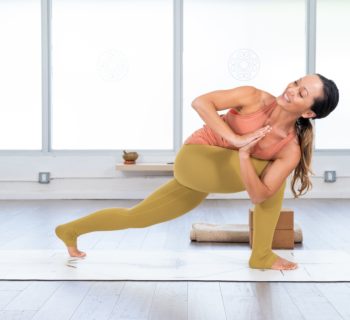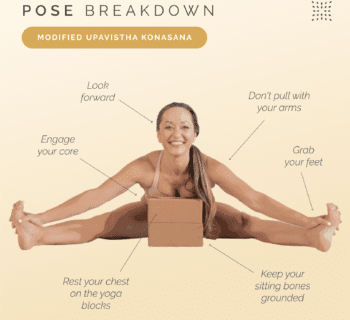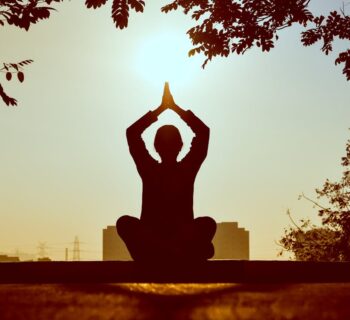Earlier this year, I had the unexpected opportunity to present at a yoga conference. With less than 24 hours to prepare, I sequestered myself and started researching and grinding out a PowerPoint on the foremost topic on my mind: power, consent, and agency in the yoga classroom, and the relationship between these concepts and issues of access.
The resulting presentation drew from a number of sources of knowledge and inspiration, notably my trauma-sensitive yoga training with David Emerson , the written work of Dr. Thema Bryant-Davis , the gathered works encompassed in Adrienne Maree Brown ’s latest release Pleasure Activism : The Politics of Feeling Good , and, of course, the inspiring work around access and inclusion that a number of organizations are doing in the yoga world.
We often associate power and agency with sexual assault and abuse. This conversation is vital, and we need conversations around power and agency in a broader context. In continuing to learn from resources like Pleasure Activism and its authors, and from my own experiences, it also occurs to me that we could tap into the erotic as a source of teaching within our own self-study practices–perhaps, as suggested in Audre Lorde’s essay “ Uses of the Erotic: The Erotic as Power ,” a seminal work of black feminist thought originally published in 1978 (and not without some problematic passages indicative of societally-held attitudes of its time), we could use our erotic experiences and resulting understanding of sexual agency to better conceptualize what it looks like to be agents in other realms–a template for how disempowered people might take some power back.
I am in absolutely no way suggesting that we sexualize the yoga space–in fact, I believe to do so would both disrespect the traditions we’re teaching from and create immense harm. However, in our private lives, we could work to recognize that our attitudes and behaviors towards sex and the broadly erotic largely mirror our beliefs and behavior elsewhere. We could use what we gather from the exploration of our sexual selves and the larger sexual politic to help us understand our relationships to power, pleasure, and agency in a larger context.
Personally, this recognition has created a dynamic shift in all of my relationships. It has influenced my understanding of what it means to sit in the teacher’s seat as well as my perception of my rights as a student. It’s also led me to this gem of what feels like understanding: as a fat, queer, non-binary femme, the dominant culture is opposed to my pleasure. If I understand what I desire, what makes me feel good, full, and fulfilled, and I am able to actively seek it, then I might reject the systems that keep that dominant culture imbued with the power to dominate. I might start demanding equitable treatment for myself and other marginalized people. My pleasure is both indicative and a source of my power.
Examine who the dominant culture desexualizes and/or fetishizes and I bet you’ll find that many of the same people viewed through these disempowering lenses are underrepresented in Western yoga spaces. These issues of constructed desirability and access are not extricable–sexuality is co-opted and intentionally weaponized against marginalized groups, and dominant culture continues to feed the narrative that only certain bodies (white, cis, thin, etc.) are appropriately sexual and, therefore, that only these bodies deserve pleasure. Don’t even get me started on the ways that the so-called wellness industry subtly correlates sex and food (sources of pleasure and survival) and implies that fat people, especially fat women and femmes, are deserving of neither.
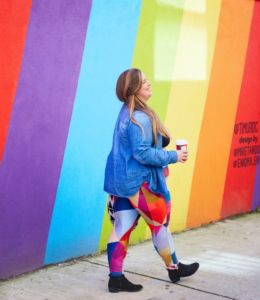
When the wellness and yoga industries place the baggage of their systematized fat phobia on me and I internalize it, my body image suffers and I feel less desirable, less worthy of pleasure and joy. Instead of moving towards my pleasure, I move towards assimilation–I diet and buy products I don’t even like, all in the name of becoming someone deserving of happiness. However, when I am resourced with real agency and knowledge of my desires, when I recognize that I am deserving just by nature of my existence, I am able to instead move towards those experiences which I find genuinely pleasurable in the body I have.
In the yoga classroom, we have the opportunity to work towards an agency-based culture that allows each individual practitioner means to access the teachings of yoga in genuine-to-themselves, agentful ways. Teachers can create opt-in scenarios and provide variations to give students a more active decision-making role in their own practices. We can practice asking for and giving consent to touch. We can create more transparency around power dynamics and start to resource one another with the tools we need to assert our rights and desires in other realms.
But by and large, we don’t. Instead, we reinforce oppressive power structures by allowing them to dictate who has access to yoga spaces (often those with the most privilege already), by centering dominant culture (through emphasis and exaltation of only highly-athletic asana and whitewashing our spaces and teachings), and by upholding authoritarian classroom management styles (insinuating there’s only one real option or insisting there’s zero space to question the teacher). When we talk about agency in the context of sexuality, we value autonomy, choice, freedom, equitable partnership, and pleasure in alignment with our ethics–why don’t we emphasize the same values in our yoga spaces? Why don’t we extend them to everybody?
I’m not sure how we practice yoga with the intentionality and discernment it asks of us without agency. There must be the possibility of “no” for “yes” to exist. If we cannot give consent (to sex, adjustments in a yoga class, or anything else) without agency, could we practice surrender, ishvara pranidhana, without it? Could we engage in deep and honest self-inquiry? I don’t believe we’re living our yoga if we’re not working to create a just and equitable world. Part of this work is giving stolen resources and opportunities for agency back to those who are marginalized through systems of oppression, those systems that hijack and manipulate essential parts of our humanity to diminish our pleasure and our joy in order to keep us disempowered.
We cannot keep recreating and upholding those systems in our yoga spaces. Instead, we might consider collectively creating an agency-based culture on the mat, the mattress, and everywhere else
By Melanie Williams
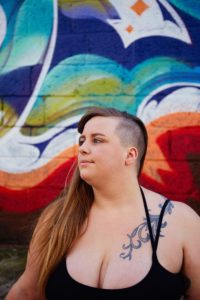
Melanie Williams is an East-Coast-based, fat, queer, non-binary yoga teacher and self-love advocate, called to create profoundly accessible spaces for self-inquiry and the inward journey by integrating mindfulness and adaptive movement practices with the spirit of social justice. They believe that the goal of yoga, as of life, is collective liberation and in turn challenge contemporary yogis to dismantle the systems and beliefs that hold us all back. In addition to teaching group and private yoga classes, Melanie offers workshops that explore queer identity and body image, leads adaptive yoga teacher trainings, helps coordinate trainings internationally for Accessible Yoga, champions diversity and inclusion in the yoga industry as a member of the Yoga & Body Image Coalition leadership team, and serves leading industry groups as an expert advisor on diversity and accessibility.
NOTE: This post is part of a collaborative media series organized and curated by Omstars and the Yoga & Body Image Coalition intended as a deep dive into yoga & body image.






